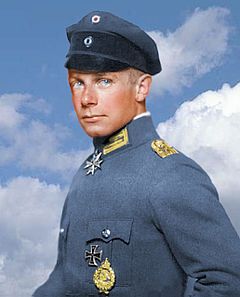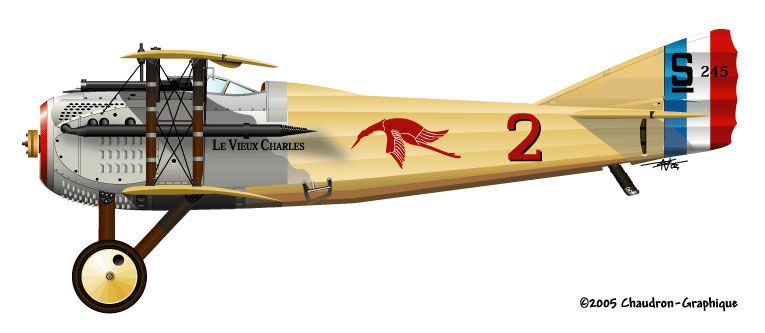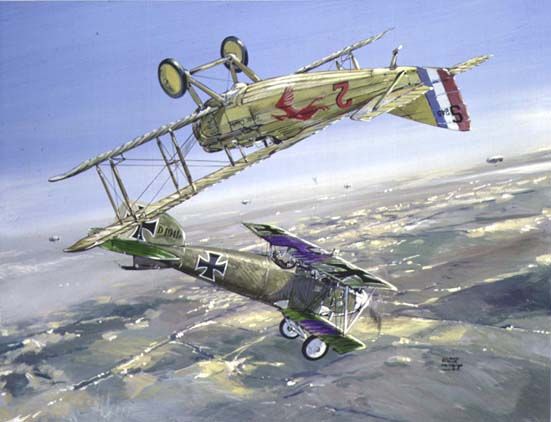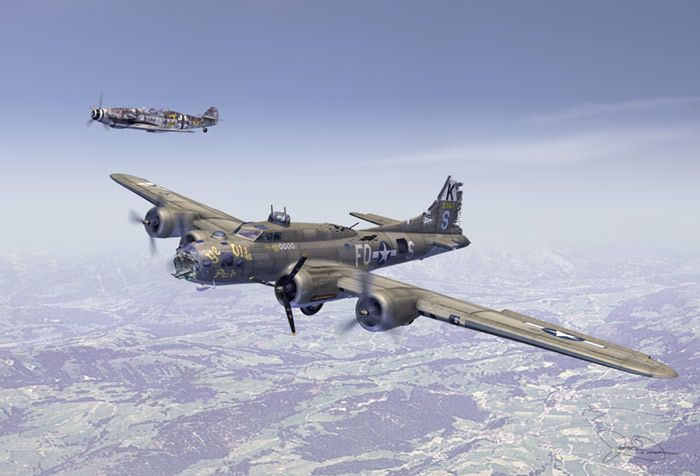Honor in a cold place
Down with a cold nasty enough to be of interest to the CDC, I woke in the middle of the night, and to return my mind to its normal serene state, dialed up an episode of Dogfights on Youtube. Most of these shows were about World War II, but I'd never seen this one on The Great War, named The First Dogfighters. (link)
I was shocked by the first battle - based on a tale in the memoirs of Ernst Udet (translated here) - both because of its outcome and because it forced in me a slight reassessment of the persistence of a certain kind of honor in German military culture during the 20th century. You might know a bit about Udet already - he was the model for Kessler in The Great Waldo Pepper, and, as every schoolchild knows, killed himself in 1941 for reasons of love, disappointment, or possibly because he'd been caught sleeping with a diplomat's wife who was working for the Russians:
He recolours well, anyway

Dogfights describes a 1917 encounter, 15,000 feet above the Western Front, between young Udet and the fearsome Georges Guynemer. At first Udet knows only that he is engaging a skilled opponent, but then sees the word "Vieux" painted on the side of the SPAD...and realizes he is up against one of the leading French Aces of the war.

At first I thought this was the story of Guynemer's death - I knew he did not survive the war, and that Udet did. But the battle seems to be going the other way. Udet gradually realizes he is outclassed, but also that there is no sense in trying to run. He fights on, and even, momentarily, finds an opening. But his guns jam. And now he know he is going to die:
Suddenly, Guynemer turned over and in inverted flight passed by head down. Immediately I released the stick beating the damned gun with two hands. The approach was primitive but sometimes it worked. Guynemer had watched me doing this and knew now I was his defenseless victim : he made another pass just over my head in almost inverted flight...

...and to my amazement made a sign with his hand and left westward.Really? In 1917?! I'd heard of some attempts at nobility early in World War I - notably in the 1914 exploits of the German cruiser Emden. But I'd also thought that by 1917 the remorseless logic of the war had infected everyone, and that each combatant understood that there was no mercy to be given or to be had. Industrial scale massacre was now routine. ("Bertie Wooster, if he ever existed, was killed round about 1915." - Orwell) As Guynemer and Udet duelled above them, the British were gearing up for the next big push at Passchendaele. The idea that a leading ace would spare the life of a competent enemy pilot seems utterly out of step with the time.
But perhaps Guynemer was out of step with his time. He could remember a slightly less-horrific time: in a world where pilot life expectancies were measured in weeks or months, he had been on active duty for two years. He was famous for his modesty and seriousness of purpose, and maybe, just maybe, he thought of himself as something more than a gladiator. Udet thought so:
Afterwards some people suggested that Guynemer's machine gun had the same problem while others thought he was afraid of me hitting him in my distress. But I don't buy that. For me, Guynemer displayed some perennial element of old chivalry that outlasted modern fighting methods. Therefore, I feel committed to contribute this personal testimony as a homage to the unknown tomb where he rests...
As I tried to get back to sleep, that last sentence preyed on my mind. Why is Udet telling me this? Guynemer was revered in France and respected in Germany, so there was no need to further burnish his image. The motive cannot be self-promotion - Udet acknowledges that he was the lesser pilot, and that Guynemer could have killed him with impunity. Am I really hearing, in this narrative from one of the founders of the Luftwaffe, an appeal for mercy and honor in modern combat?
It's strange, but sometimes a question like that sticks with you, other times it just fades from your mind. I suppose I would have let it go, but just this evening I've stumbled across another article, about an event decades later, that suggests Udet had at least a few like-minded comrades:
“If I ever see or hear of you shooting at a man in a parachute,” Roedel said, “I will shoot you down myself. You follow the rules of war for you — not for your enemy. You fight by rules to keep your humanity.”
Charlie Brown and Franz Stigler incident (link)

Stigler was prepared to shoot down the B-17 until he realized there was no capacity for resistance:
I flew beside them for a long time. They were trying desperately to get home and I was going to let them do that. I could not have shot at them. It would have been the same as shooting at a man in a parachute.
I found an interview with Stigler from a few years ago that suggests how deeply he held this belief, and how much he was willing to risk for it:
Q: Why did you stay with him for so long?
A: …Because I didn’t want anyone else to get him…
(The book will be out December 31st.)


1 Comments:
Very cool post. Thanks!
Post a Comment
<< Home